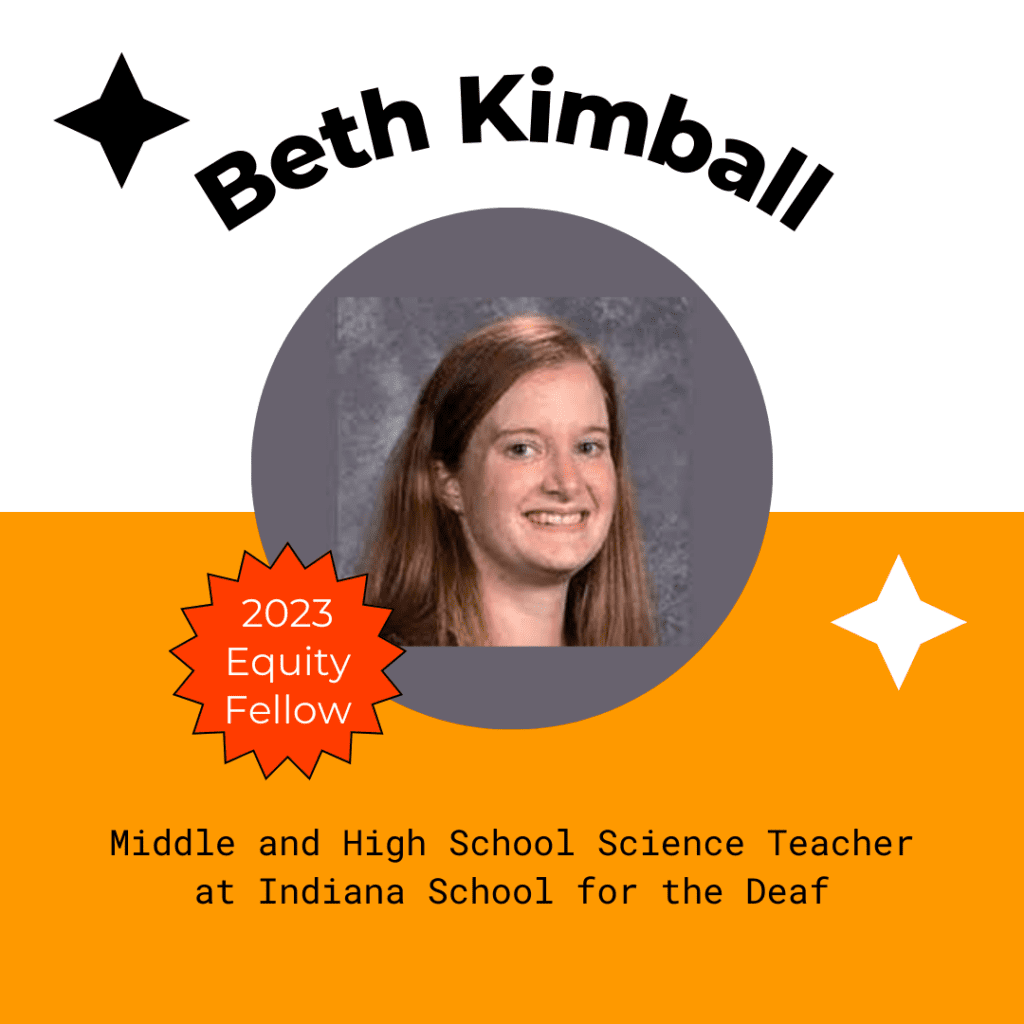Beth Kimball is in her tenth year at Indiana School for the Deaf, the first state school for Deaf students that was established by a Deaf person. She teaches middle school science and high school dual-credit science courses. Through an AccessCSforAll grant, Beth previously led a webinar for teachers of Deaf and Hard-of-Hearing students, providing resources and strategies to help those teachers make CS curriculum accessible to their students. A lifelong learner, Beth is always in search of new skills to acquire. Her current hobbies include gobbling up true crime books and TV shows, solving Rubik’s Cubes, and fixing bicycles.
Beth is a tireless advocate for the needs of Deaf and Hard-of-Hearing (HoH) students in computer science. “In our school, Deafness is not seen as a disability, because it is a common denominator for all students and staff,” she says. Even so, she and her students have faced challenges in finding CS educational content that’s fully accessible to Deaf students. Many videos and tutorials are uncaptioned, and many workshops and other educational events do not provide ASL interpreters.
After losing her hearing in her twenties, and with a decade of teaching experience under her belt, Beth has both professional and lived expertise in evaluating content for accessibility. She previews all educational content for accessibility before sharing it with her students, and she works with students to tackle barriers that she might have missed.

Beth hopes that her work and advocacy can help teachers to overcome any hesitancy they may feel when they see Deaf/HoH on a student’s IEP. In her experience, CS is one of the easiest academic fields for Deaf students to succeed in, because so much of the work is visual in nature. “They’re in control once they learn the techniques,” she says. “A lifetime of missing information and having to observe the world around them to make sure they’re not missing too much sets them up with a wonderful mindset of being willing to try and learn from mistakes.”
Her AccessCSforAll webinar was a deeply rewarding experience, because it offered her the chance to help other teachers see the tremendous potential among their Deaf/HoH students. Whether attendees were current teachers of Deaf/HoH students or just interested in learning more about working with that population, Beth was proud to be able to shed light on the experience of those learners. The webinar is just one of the ways Beth works to share her expertise on Deaf/HoH CS students. She has also worked directly with curriculum providers to improve accessibility for Deaf/HoH students as well as other students with disabilities (auditory processing disorders, ADHD, autism, etc.) for which captions would be helpful in understanding the material.
Another of Beth’s fundamental values is her belief in the power of collaboration. “I strongly believe that I cannot do my best teaching without input and feedback from others,” she says. She regularly observes other teachers in their classrooms and invites them to observe her, too. As compared with other academic subjects, CS still offers fewer resources overall, so Beth believes it’s vital to work with her fellow CS educators wherever possible to improve her own practice. She emphasizes, “We’re all learning from each other!”
As a CSTA Equity Fellow, Beth is eager to learn how educators in different school settings approach their Deaf and Hard-of-Hearing students, as well as other students with related disabilities such as auditory processing issues. While Beth’s school teaches only Deaf/HoH students, she hopes to find ways to ensure that Deaf/HoH students in traditional school settings are still receiving CS education, rather than being shut out from the subject by a lack of accommodations. Noting that “teachers thrive on communities of like-minded people,” Beth dreams of creating a CSTA chapter specifically for teachers of Deaf/HoH students, whether in Deaf schools, public schools with a dedicated Deaf program, public schools with Deaf students and interpreters, or schools that focus on speech and hearing with Deaf students. “This way,” says Beth, “we could make sure that CS materials are truly accessible, not only for a specific set of Deaf students, but for everyone.”
Beth loves the feeling of pride and satisfaction that comes from seeing her students finish a project or learn something new in the field of CS. “When provided with accessible content, Deaf students can produce amazing work,” she says. “It just requires a few modifications to make sure they’re getting all of the information from the beginning.”
